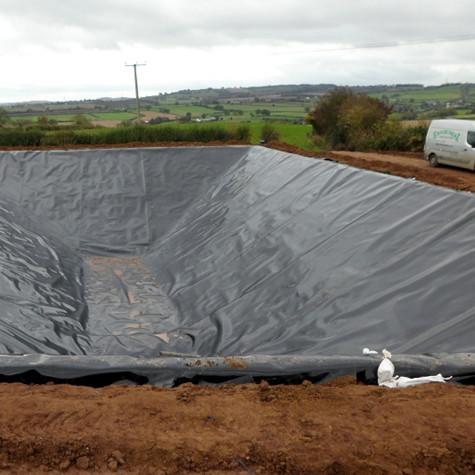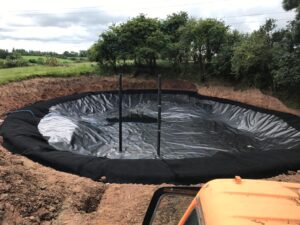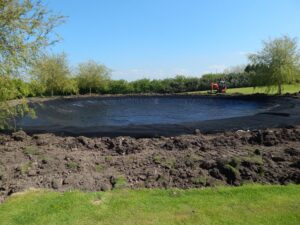Slurry storage lagoons are vital reservoirs designed to contain agricultural waste, primarily animal slurry or manure, offering numerous benefits that positively impact farming practices, environmental conservation, and resource management.
Efficient Waste Management:
Slurry storage lagoons provide a designated space for storing animal waste, allowing farmers to manage these by-products efficiently. Storing slurry in lagoons prevents runoff, leaching, and potential contamination of soil and water sources.
Nutrient-Rich Organic Fertiliser:
Stored slurry serves as a valuable nutrient source for crops when used as organic fertiliser. Properly managed slurry, applied in controlled amounts, enriches the soil with essential nutrients, enhancing plant growth and improving soil fertility.
Odour Reduction and Environmental Protection:
Containment in slurry storage lagoons significantly reduces odour emissions associated with untreated animal waste. This not only creates a more pleasant environment for farm workers and neighbouring communities but also contributes to environmental protection by minimising air pollution.
Water Quality Improvement:
By storing slurry, lagoons prevent the leaching of harmful substances into water sources, improving water quality and safeguarding local ecosystems against potential contamination.
Regulatory Compliance and Environmental Responsibility:
Slurry storage lagoons aid farmers in complying with environmental regulations by providing a controlled and compliant method for managing agricultural waste. Meeting these standards ensures responsible waste management practices.
Erosion Control and Land Preservation:
Lagoons prevent soil erosion by containing slurry, maintaining the land’s integrity, and preserving fertile topsoil. This helps conserve arable land and contributes to sustainable farming practices.
Safety and Public Health:
Proper containment of slurry in lagoons minimises direct exposure to potentially harmful substances, promoting public health and creating a safer environment for farm workers and nearby communities.
Reduced Runoff and Nutrient Loss:
By storing slurry, lagoons reduce runoff and nutrient loss, ensuring that valuable nutrients remain available for crop uptake, thereby maximising their beneficial impact on agricultural productivity.
Agricultural Sustainability:
Efficient slurry management through storage lagoons promotes agricultural sustainability by recycling organic waste into a valuable resource for soil improvement and crop production.
Cost Savings and Resource Efficiency:
Using stored slurry as fertiliser reduces the need for chemical fertilisers, leading to cost savings for farmers and promoting resource efficiency in agriculture.
Community Support and Environmental Consciousness:
Implementing slurry storage lagoons showcases a commitment to environmentally friendly farming practices, garnering community support and fostering a culture of environmental consciousness among stakeholders.
In conclusion, slurry storage lagoons are indispensable in modern agriculture, offering benefits that encompass efficient waste management, soil enrichment, environmental protection, and community well-being. These lagoons represent a crucial element in sustainable farming, promoting responsible waste management while maximising the benefits of agricultural by-products for soil health and crop productivity.
To find out more about our products and services and how we can help you, please contact us using the below –
Tel: 01695 228626
Email: enquiries@enviroseal.co.uk





